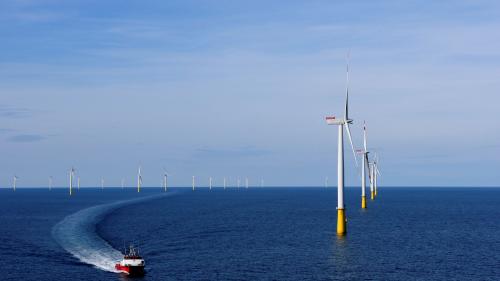In two weeks, G-20 leaders will meet in Osaka to take up a range of pressing global issues, after which a set of key U.N. summits in September will convene world leaders to take stock of and chart forward progress in three vital areas: the 2030 Agenda, climate action, and financing for development.
The U.N. Climate Summit will test the willingness of world leaders, including G-20 countries, to scale up ambitions to tackle the urgent threat of climate change. Accounting for more than 80 percent of global emissions, the role of the G-20 is pivotal. Related to this, I participated in a July 13 meeting in Tokyo of the F20, a group comprising more than 50 international foundations, where the F20 warned of the danger of ignoring climate change and sustainability at the upcoming G-20 Summit.
The Paris Agreement has been widely regarded as a turning point, signaling the willingness of the world to confront an existential planetary threat. The Paris Agreement commits the world’s nations to “holding the increase in the global average temperatures to well below 2 C above pre-industrial levels and pursuing efforts to limit the temperature increase to 1.5 C above pre-industrial levels,” as well as to build resilience in the face of climate change.
Although the United States has indicated its withdrawal from the Paris Agreement, the rest of the G-20 can exercise leadership by implementing ongoing NDCs (Nationally Defined Contributions that set out country action plans and targets on climate) and by preparing even more ambitious NDCs for the subsequent five years in the lead up to the 26th Conference of the Parties (COP 26, slated for November 2020). The need for strong ambition to meet key targets was clearly recognized in Paris in 2015, but the scale and urgency of the challenge are starker than ever, for two reasons. First, emissions keep rising, adding to the urgency for actions that will drastically reduce emissions (as highlighted in the October 2018 Special Report on Global Warming of 1.5 C). Second, the risks posed by global warming have become much more apparent, with mounting evidence of costs, and there is now an improved understanding of the significant differences in risks between the 1.5 C and 2 C outcomes.
The G-20 has a central role in raising ambition to meet the 1.5 C target. A new report, “Aligning G20 Infrastructure Investment with Climate Goals & the 2030 Agenda,” prepared by myself and a team from the Global Economy and Development program at the Brookings Institution as well as the Global Development Policy Center of Boston University, assesses the role of the G-20 in infrastructure and climate and identifies the critical areas where strong G-20 leadership is needed to build the necessary momentum behind actions that can deliver on the 1.5 C target.
The G-20 can exercise leadership by implementing ongoing NDCs, which set out country action plans and targets on climate. G-20 policymakers can prepare even more ambitious NDCs for the subsequent five years in the lead up to COP 26. All advanced G-20 countries should set pathways for a 50 percent reduction in emissions by 2030 and all G-20 members should commit to a net zero emission target by 2050. Encouragingly, the U.K. became the first country this week to propose a legally binding commitment to meet the zero emission target by 2050.
To push forward on ambitious climate action, much stronger engagement and leadership are needed from economic decisionmakers, especially finance ministers. In this vein, a new coalition of finance ministers on climate action announced in April 2019 is providing a promising platform for collective action.
To support more ambitious NDCs, G-20 countries should mainstream and set credible targets for carbon pricing and set firm deadlines for the elimination of fossil fuel subsidies. Both can generate substantial revenues that can be used to finance an increase in sustainable investments and help facilitate a just transition to a low-carbon, climate-resilient world. G-20 countries need to immediately phase out coal-fired power plants and set timelines to phase out all fossil fuels.
Scaling up and improving the quality of infrastructure investments is mission critical. The G-20 has had a long-standing focus on infrastructure investment and finance; under Japan’s G-20 Presidency there has been a special initiative to develop the G-20 Principles of Quality Infrastructure that were enunciated at the G-20 Finance Ministers Meeting June 8-9, 2019. These principles set out many important elements to ensure the development impact and soundness of infrastructure investments. Among these elements are goals to: maximize the positive impact of infrastructure while preserving fiscal sustainability; raise economic efficiency with a focus on life cycle cost; integrate environmental and social considerations, and; ensure effective governance including transparency and integrity. But special emphasis must be given to climate impact and resilience, and to natural capital and nature-based solutions more broadly.
The G-20 also has a central role to play in mobilizing finance at scale that is strongly aligned to the SDGs and the 1.5 C target. The G-20 should reaffirm its support for the commitments made by developed countries to mobilize an additional $100 billion per annum and in particular to deliver on the critical shortfalls in grant financing, including the successful replenishment of the Green Climate Fund. The G-20 should re-engage on the sustainable finance agenda to shift the whole of finance. The G-20 should move towards mandatory reporting in line with the Task Force on Climate-Related Financial Disclosure Framework and give impetus to the recommendations of the Network on Greening the Financial System to incorporate climate risk into prudential and risk assessment frameworks.
Finally, the G-20 must break out of past inertia to unleash the potential of the multilateral development banks (MDBs) and the system of development finance institutions more broadly. This would entail building on the recommendations of the G-20 Eminent Persons Group. The MDBs and the broader network of development finance institutions, including the International Development Finance Club (IDFC), are uniquely positioned to provide global leadership on the “billions to trillions” agenda to mobilize the scale of finance needed to deliver on the 2030 Agenda for Sustainable Development and the Paris Agreement. The role of the MDBs can be significantly enhanced through better aligning lending practices with the Paris climate goals, and by ensuring that they work better as a system to support policy and institutional strengthening, unlock investment opportunities, and mobilize financing at scale, especially from the private sector as the G-20 Eminent Persons group has argued.
While the MDBs can do more with existing capital, including by leveraging and multiplying resources in the private sector, the scale and urgency of the challenge will necessitate a significant capital expansion. Consensus within the G-20 on such an expansion will be essential to securing broad-based shareholder support.
All of this may seem overly ambitious. But as the 2018 report of the New Climate Economy has argued, the transition to a low-carbon, climate-resilient economy offers the opportunity to shape a much more attractive growth path—one that is driven by innovation, high quality and sustainable investments, and the dynamism of the private sector. This path will also deliver significant co-benefits, including reduced pollution and congestion, more dynamic and productive cities, and ecosystems that are robust and thriving. In contrast, if we stay on the present course, we are risking the future of the planet and people, especially the poor and vulnerable.
There is no greater or more urgent task for the G-20, and G-20 leaders must rise to the urgency and scale of the challenge two weeks from now.







Commentary
Will the G-20 provide the urgent leadership needed on climate action?
June 14, 2019